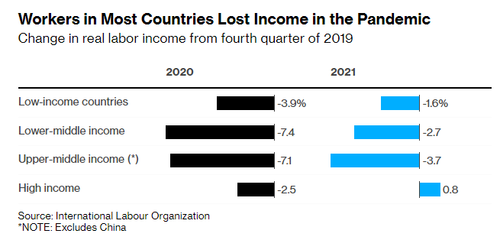Labor Has The Leverage: Protesting Supply Chain Workers Threaten To Worsen The World’s Inflation Crisis
Key workers in supply chains across the globe know that their jobs have never been more crucial – and they’re taking advantage of that leverage, demanding better working conditions.
Labor protests have been turning up at all spots in the global supply chain, including railways, trucking, warehouses and ports, in locations spanning Australia to Peru, according to a new Bloomberg writeup.
Katy Fox-Hodess, a lecturer in employment relations at Sheffield University Management School in the UK, commented: “Global supply chains weren’t calibrated to deal with a crisis like the pandemic, and employers have really pushed that crisis onto the backs of workers.”
With no bigger issue politically right now than inflation, chokepoints in supply chains that can have a profound effect on prices have become extraordinarily important. Even just the threat of strikes can cause price spikes, as happened in Norway this year when energy workers threated a strike and European natural gas prices rose as a result.
In the U.S., the threat of a rail strike looms large, as President Biden attempts to help arbitrate terms for 115,000 workers and their employers, the report says.
The biggest threat in the U.S. is 22,000 West Coast dockwokers whose contract expired in the beginning of July. They are in the midst of negotiating a new contract and both workers and employers have said they are aiming to prevent a shut down of ports.
Cornell University said there were 260 strikes involving 140,000 employees in 2021, culminating in about 3.27 million strike days. Associate professor Eli Friedman said: “There’s a very tight labor market, so that puts workers in a position where they have both an accumulation of lots of grievances and they feel empowered.”
The U.K. faces a similar issue, where train drivers are threatening to strike on July 30. Canada saw “tens of thousands” of construction workers walk out of their jobs in May and its railways have also dealt with the threat of strikes.
Truckers in Peru are holding a nationwide strike this month. Argentina and South Africa have also faced delays due to protesting workers. German ports just dealt with a two day strike and South Korea’s shipbuilding industry is also facing protests.
Outside of the supply chain, labor unrest has continued. Airlines, already short-staffed after the pandemic, have seen schedule disruptions due to worker strikes. Charles de Gaulle Airport in Paris had to cancel flights after a worker walkout and Heathrow narrowly avoided a similar fate with its workers.
Tyler Durden
Mon, 07/25/2022 – 06:55

